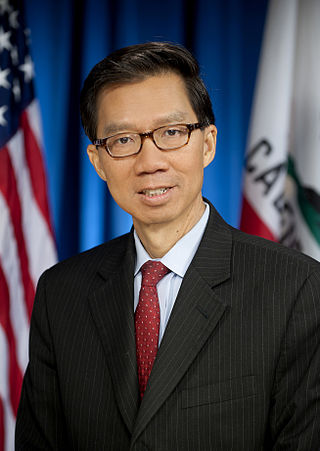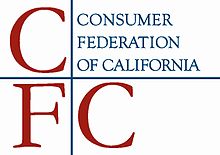
The Gramm–Leach–Bliley Act (GLBA), also known as the Financial Services Modernization Act of 1999, is an act of the 106th United States Congress (1999–2001). It repealed part of the Glass–Steagall Act of 1933, removing barriers in the market among banking companies, securities companies, and insurance companies that prohibited any one institution from acting as any combination of an investment bank, a commercial bank, and an insurance company. With the passage of the Gramm–Leach–Bliley Act, commercial banks, investment banks, securities firms, and insurance companies were allowed to consolidate. Furthermore, it failed to give to the SEC or any other financial regulatory agency the authority to regulate large investment bank holding companies. The legislation was signed into law by President Bill Clinton.
The Electronic Privacy Information Center (EPIC) is an independent nonprofit research center established in 1994 to protect privacy, freedom of expression, and democratic values in the information age. Based in Washington, D.C., their mission is to "secure the fundamental right to privacy in the digital age for all people through advocacy, research, and litigation." EPIC believes that privacy is a fundamental right, the internet belongs to people who use it, and there's a responsible way to use technology.
Cindy Ossias is an American lawyer. In the early months of the year 2000, while serving as a long-time senior lawyer for the California Department of Insurance (CDI), Ossias leaked confidential documents exposing the allegedly illegal and corrupt activities of Chuck Quackenbush, then Insurance Commissioner of California and head of CDI, to the state legislative consultant investigating the Commissioner's actions. In 2004, Ossias also took a seat as Director for California government watchdog group Californians Aware.
Information privacy, data privacy or data protection laws provide a legal framework on how to obtain, use and store data of natural persons. The various laws around the world describe the rights of natural persons to control who is using its data. This includes usually the right to get details on which data is stored, for what purpose and to request the deletion in case the purpose is not given anymore.

Mark Leno is an American politician who served in the California State Senate until November 2016. A Democrat, he represented the 11th Senate district, which includes San Francisco and portions of San Mateo County. Before the 2010 redistricting, he represented the 3rd Senate district.

The California Department of Insurance (CDI), established in 1868, is the agency charged with overseeing insurance regulations, enforcing statutes mandating consumer protections, educating consumers, and fostering the stability of insurance markets in California. The CDI has authority over how the insurance industry conducts business within California, and licenses and regulates the rates and practices of insurance companies, agents, and brokers in the state.
The Department of Managed Health Care (DMHC) is a regulatory body governing managed health care plans, including Health Maintenance Organizations (HMOs) and most Medi-Cal managed care plans in California. The DMHC was created as the first state department in the country solely dedicated to regulating managed health care plans and assisting consumers to resolve disputes with their health plans. The DMHC Help Center educates consumers about their health care rights, resolves consumer complaints, helps consumers navigate and understand their coverage and assists consumers in getting timely access to appropriate health care services.
Consumer protection is the practice of safeguarding buyers of goods and services, and the public, against unfair practices in the marketplace. Consumer protection measures are often established by law. Such laws are intended to prevent businesses from engaging in fraud or specified unfair practices to gain an advantage over competitors or to mislead consumers. They may also provide additional protection for the general public which may be impacted by a product even when they are not the direct purchaser or consumer of that product. For example, government regulations may require businesses to disclose detailed information about their products—particularly in areas where public health or safety is an issue, such as with food or automobiles.
Bank regulation in the United States is highly fragmented compared with other G10 countries, where most countries have only one bank regulator. In the U.S., banking is regulated at both the federal and state level. Depending on the type of charter a banking organization has and on its organizational structure, it may be subject to numerous federal and state banking regulations. Apart from the bank regulatory agencies the U.S. maintains separate securities, commodities, and insurance regulatory agencies at the federal and state level, unlike Japan and the United Kingdom. Bank examiners are generally employed to supervise banks and to ensure compliance with regulations.

The California Health and Safety Code is the codification of general statutory law covering the subject areas of health and safety in the state of California. It is one of the 29 California Codes and was originally signed into law by the Governor of California on April 7, 1939.
Consumer Watchdog is a non-profit, progressive organization which advocates for taxpayer and consumer interests, with a focus on insurance, health care, political reform, privacy and energy.
The California Online Privacy Protection Act of 2003 (CalOPPA), effective as of July 1, 2004 and amended in 2013, is the first state law in the United States requiring commercial websites on the World Wide Web and online services to include a privacy policy on their website. According to this California State Law, under the Business and Professions Code, Division 8 Special Business Regulations, Chapter 22 Internet Privacy Requirements, operators of commercial websites that collect Personally Identifiable Information (PII) from California's residents are required to conspicuously post and comply with a privacy policy that meets specific requirements. A website operator who fails to post their privacy policy within 30 days after being notified about noncompliance will be deemed in violation. PII includes information such as name, street address, email address, telephone number, date of birth, Social Security number, or other details about a person that could allow a consumer to be contacted physically or online.
The California Green Chemistry Initiative (CGCI) is a six-part initiative to reduce public and environmental exposure to toxins through improved knowledge and regulation of chemicals; two parts became statute in 2008. The other four parts were not passed, but are still on the agenda of the California Department of Toxic Substances Control green ribbon science panel discussions. The two parts of the California Green Chemistry Initiative that were passed are known as AB 1879 : Hazardous Materials and Toxic Substances Evaluation and Regulation and SB 509 : Toxic Information Clearinghouse. Implementation of CGCI has been delayed indefinitely beyond the January 1, 2011.

The New York State Department of Financial Services is the department of the New York state government responsible for regulating financial services and products, including those subject to the New York insurance, banking and financial services laws.

Edwin “Ed” Chau is an American jurist and politician who served in the California State Assembly as a Democrat representing the 49th state assembly District from 2012 to 2021. On November 29, 2021, California Governor Gavin Newsom appointed Chau to be a judge in the Los Angeles County Superior Court.
The California Bureau of Real Estate Appraisers (BREA) is a division of the California Department of Consumer Affairs responsible for real estate appraiser licensing and certification in California.
This article summarizes healthcare in California.

Ed Howard is an American public interest lawyer and strategist who currently works as senior counsel for the Children's Advocacy Institute and the Center for Public Interest Law based at the University of San Diego School of Law. He is also president of Howard Advocacy in Sacramento, California.

Arnold Schwarzenegger was an early opponent of same-sex marriage in the United States, including during his Governorship of California. As an elected official he opposed legal recognition of same-sex marriage but otherwise he supported LGBT rights legislation, including civil unions.
The California Consumer Privacy Act (CCPA) is a state statute intended to enhance privacy rights and consumer protection for residents of the state of California in the United States. The bill was passed by the California State Legislature and signed into law by the Governor of California, Jerry Brown, on June 28, 2018, to amend Part 4 of Division 3 of the California Civil Code. Officially called AB-375, the act was introduced by Ed Chau, member of the California State Assembly, and State Senator Robert Hertzberg.








